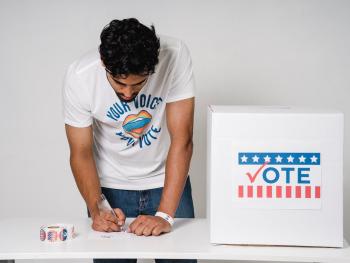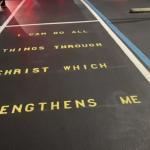
Lydia Franklin says her church leaders don’t talk much about politics. However, they talk about Jesus, His commands to love your neighbors, and the importance of Christians helping others. So when the 18-year-old went to the polls for the first time this election, she took those values into the voting booth. Franklin, who lives in Oklahoma, said, “To be evangelical is to follow Jesus Christ and to do as he teaches in the Bible. I feel that, as Christians, we are called to help people. What better way to help than to vote for people that will get the job done?”
Franklin was part of the estimated 27 percent of Gen Z that voted in the midterm election—a notably higher turnout rate than millennials and Gen Xers when they were between 18 and 29. The turnout doesn’t surprise Kevin Singer, the nonprofit Neighborly Faith (NF) president. He has been looking at younger evangelicals’ civic engagement and the influences on their politics.
A recent NF study, done jointly with Philanthropy for Active Civic Engagement and Springtide Research Institute, surveyed nearly 2,000 people ages 18 to 25, oversampling those who identified as evangelical (24 percent) and born-again (54 percent) and asking questions about their views of Jesus and the Bible. They wanted to see how faith shapes civic engagement for Gen Z. What they found is that Gen Z evangelicals are activists.
More than half say it’s essential for them to vote, but about 45 percent say they also get involved in community service and fundraising. They are more likely than their nonevangelical, non-Christian, and nonreligious peers to say they believe in advocating for a cause, engaging with local government, and even protesting.
“Young evangelicals are consistently engaging with the civic and social and political life of this country, more so than their peers of other faith groups, of other Christian groups,” Singer said. “There’s something about being evangelical, I think, in America as a young person that just draws you out into society and draws you into social and political issues and draws you into political conversations. It draws you into having a really strong opinion about issues of concern in our society and in our elections.”
According to the study, evangelicals of color lead the way in every measure of civic engagement. But even white evangelicals, considered separately, were 10 points more likely than their nonreligious peers to say that they protested and 15 points more likely to say they engaged with a community group.
Gen Z is also less likely than older cohorts to be partisan. “It was extremely unlikely that young evangelicals would contribute to a ‘wave’ in either direction [in the midterm election],” Singer said. “Our data shows this group watches CNN and Fox News at the same rates. They listen to both Ben Shapiro and Bernie Sanders.”
Other media figures they listen to for political perspective include Donald Trump and Joe Biden, Elon Musk, Candace Owens, Jimmy Kimmel, and Joe Rogan. Most younger evangelicals say they are not taking their cues from media figures. They are more likely to look to their religious leaders.
Nearly 40 percent say a religious leader has influenced their political opinions. “Prayer leaders” were ranked most influential in this aspect of their lives (approximately 48 percent), followed by assistant pastors (43 percent), pastors (41 percent), camp leaders (39 percent), and worship ministers (37 percent). Only 16 percent of young evangelicals said leaders in the church don’t impact their politics at all.


